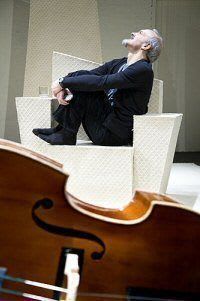When German writer Patrick Süskind wrote Perfume, he described smells with such imagination and accuracy that to read the book is like smelling with your eyes. In his one-man play The Double Bass, which he wrote before the novel, he proves that his gift is not limited to the olfactory.
The set is sparse, allowing the double bass to dominate the space. Its player, performed by Christopher Hunter, walks and leaps across the stage and even dances a bit as he describes his relationship with the instrument, gesticulating wildly with his arms as he gets progressively drunker. He starts with a history lesson, reeling off facts and figures in a conversational tone that would make any teacher envious - even those with no interest in music will be interested in all Hunter has to say about the double bass.
Throughout the play, Hunter drops in facts and composers, but the play never strays from its human interest story. This is no music lover trying to impress with his endless knowledge; this is a play about how being a bassist has come to define a person.
The combination of Hunter and Süskind (with translation by Michael Hofmann) is a marriage made in heaven. Hunter uses Süskinds words to evoke the atmosphere from the opening of an opera to the claustrophobia of his sound-proofed flat. The hour-and-a-half long monologue uses such wonderful description without ever lapsing into the fanciful; between the two of them, the piece never loses its conversational tone.
In the same way, the double bass is a metaphor but without the metaphor ever becoming strained or having too much attention drawn to it. It is subtly woven in so that the bass dominates every part of the bassist's life. Hunter is funny and tragic by turns, going from pride at playing the deepest instrument in the orchestra - bottom E he proudly states as he plays for us - to paranoid personification of the instrument as it watches him every time he wants to be alone with a woman.
The bassist talks about the woman who hed like to be alone with - a mezzo-soprano called Sarah who has never looked his way. Whilst adoring her, he also hates her for going to fancy fish restaurants with other men. "Forty-five quid for dover sole!" he rages before proudly stating that, for Sarah, hed pay fifty. But shell never see him, playing at the back of the orchestra on an instrument that he cant accompany her on. There are only two musical pieces written for soprano and double bass, he tells us before rattling off the composers who have written for double bass, all of them obscure.
The Double Bass is about a man stuck in a rut where the security of his job becomes stifling and the sound-proofed room only serves to lock him in with his biggest obstacle. Its funny, its tragic and its altogether very human. Whilst eschewing psycho-analysis, the bassist manages to perfectly psycho-analyse himself throughout the course of a bottle of wine. Süskind knows people just as well as he knows music.
